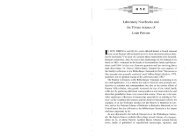Ideas for a Philosophy of Nature
Ideas for a Philosophy of Nature
Ideas for a Philosophy of Nature
You also want an ePaper? Increase the reach of your titles
YUMPU automatically turns print PDFs into web optimized ePapers that Google loves.
26 <strong>Ideas</strong><strong>for</strong> a <strong>Philosophy</strong> oINaitto function as sensible things, should ever have come into anybody'shead?'Indeed, if everything that belongs to the presentation <strong>of</strong> an objectiveworld is eliminated be<strong>for</strong>ehand, what is there left <strong>for</strong> me to understand?Clearly, only myself So all ideas <strong>of</strong> an external world wouldhave to develop out <strong>of</strong> me, myself. For if succession, cause, effect, andthe rest, first attach to things in my representation <strong>of</strong> them, one can aslittle conceive what those concepts could be without the things, as whatthe things could be without the concepts. Hence the venturesomeexplanation which this system is constrained to give <strong>of</strong> the origin <strong>of</strong>representation. In opposition to things-in-themseives it sets up amind, and this mind contains in itself certain a priori <strong>for</strong>ms, whichhave only this advantage over things-in-themselves, that one can atleast represent them as something absolutely empty. In representingthe things, we apprehend them in these <strong>for</strong>ms. Thereby the <strong>for</strong>mlessobjects acquire structure; the empty <strong>for</strong>ms, content. How it happensthat things come to be represented at all, about that there is thedeepest silence. It is enough that we represent things as external to us.Only in the representation, however, do we first carry space and timeover to them, and further, the concepts <strong>of</strong> substance and accident,cause and effect, and so on. Thus the succession <strong>of</strong> our ideas arises inus, and indeed a necessary succession; and this self-made succession,first brought <strong>for</strong>th in consciousness, is called the course <strong>of</strong> <strong>Nature</strong>.This system requires no refutation. To propound it is to overturn itfrom the bottom up. In fact, the Humean scepticism is vastly sirperiorand not at all comparable to it. Hume (faithful to his principles) leavesit altogether undecided whether our ideas correspond to things outsideus or not. In every case, however, he has to assume that thesuccession <strong>of</strong>appearances takes place only in our ideas; but that we takejust this particular succession as necessary he declares to be pure illusion.But what one can justly demand <strong>of</strong> Hume is that he at leastexplain the source <strong>of</strong> this illusion. For that we do actually think <strong>of</strong> asequence <strong>of</strong> causes and effects as necessary - that thereon rest all ourempirical sciences, theory <strong>of</strong> <strong>Nature</strong> and history (in which he washimself so great a master), he cannot deny. But whence this illusionitself? Hume answers: "From custom; because hitherto the appearanceshave followed one another in this order, the imagination has accustomeditself to expect the same order also in the future, and this expectationhas, like every long habituation, ultimately become <strong>for</strong> us a second" The truth is that the idea <strong>of</strong> things-in-themselves had come down to Kant throughthe tradition and had lost all meaning in the course <strong>of</strong> inheritance. [This note islacking in the first edition.]Introduction27ure." But this explanation turns in a circle, <strong>for</strong> the very thing thatto be explained was why things have hitherto followed one another in. order (which Hume does not deny). Was this sequence perhapsething in the things outside us? But apart from our ideas there issuccession. Or, if it was merely the succession <strong>of</strong> our ideas, then ason <strong>for</strong> the persistence <strong>of</strong> this succession must also be given. Whatists independent <strong>of</strong> me I am unable to explain; but <strong>for</strong> what goes only in me the reason must be found also in me. Hume can say: It is so,d that satisfies me. But this is not to philosophize. I do not say that ame ought to philosophize, but once a man proclaims that he wants toilosophize, he can no longer dismiss the question, Why?o nothing remains but the attempt to derive the necessity <strong>of</strong> acession <strong>of</strong> presentations from the nature <strong>of</strong> our mind, and so <strong>of</strong> theite mind as such, and, in order that this succession may be genulyobjective, to have the things themselves, together with this seence,arise and come into being in it.Among all previous systems I know only two - the Spinozistic ande Leibnizian-which not only undertook this attempt, but whosetire philosophy is nothing else but this attempt. Now because therestill at present much doubt and discussion about the relation <strong>of</strong>ese two systems-whether they contradict each other, or how theyhere-it seems useful to say something about them at the outset.Spinoza, as it seems, was worried at a very early stage about thennection <strong>of</strong> our ideas with things outside us, and could not toleratee separation which had been set up between them. He saw that ideald real (thought and object) are most intimately united in our nae.That we have ideas <strong>of</strong> things outside us, that our ideas evench out beyond the things, he could explain to himself only in termsour ideal nature; but that these ideas correspond to actual things, heto explain in terms <strong>of</strong> the affections and determinations <strong>of</strong> the idealus. There<strong>for</strong>e we could not become aware <strong>of</strong> the real, save inntrast to the ideal, or <strong>of</strong> the ideal, save in contrast to the real.cordingly, no separation could occur between the actual things andr ideas <strong>of</strong> them. Concepts and things, thought and extension, were,r this reason, one and the same <strong>for</strong> him, both only modifications <strong>of</strong>e and the same ideal nature.However, instead <strong>of</strong>descending into.the depths <strong>of</strong> his self-consciousssand descrying the emergence thence <strong>of</strong> the two worlds in us - theal and the real- he passed himself by; instead <strong>of</strong> explaining fromr nature how finite and infinite, originally united in us, proceediprocally from each other, he lost himself <strong>for</strong>thwith in the idea <strong>of</strong>anfinite outside us. In this infinity there arose, or rather originallyre-one knows not whence-affections and modifications, and with



